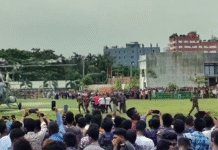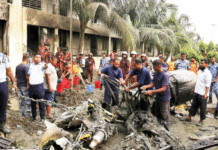2023.10.04 Dhaka
 Family members of individuals who died in police custody gather in a protest rally in front of the National Press Club in Dhaka, Bangladesh, July 14, 2023.
Family members of individuals who died in police custody gather in a protest rally in front of the National Press Club in Dhaka, Bangladesh, July 14, 2023.
Two men who died Tuesday while in police custody in separate Bangladeshi districts were victims of torture at the hands of officers, relatives of the detainees alleged on Wednesday.
In both instances, with postmortem reports still pending, the respective police units denied the accusations that the two were tortured or that they had died as a result of being physically forced to answer questions under interrogation.
Authorities in the South Asian nation consistently come out with similar denials in such cases or say they will investigate the deaths, although human rights advocacy groups here have long been raising the alarm about the alleged torture of detainees and suspicious in-custody deaths.
In the latest cases, detainees Syed Mohammad Shahidullah and Habibur Rahman had been implicated in separate criminal cases in Chittagong and Bogura districts, respectively.
“Police officials in plain clothes forcibly dragged my uncle out of the house,” Syed Sakib Ahmed, a nephew of Syed Shahidullah, told BenarNews on Wednesday. “The cops did not allow him to take his regular medicine. They tortured him mentally. He died because he could not bear it anymore.”
Shahidullah was a former official with the Anti-Corruption Commission, a government body responsible for busting graft.
Bangladesh’s law against custodial torture criminalizes “mental torture” of people in the custody of security forces.
Local and international human rights organizations routinely say that instances of custodial torture during interrogation by security forces are widespread in Bangladesh.
Odhikar, a domestic human rights group, documented the deaths of 11 people in custody last year due to alleged torture.
As of September, at least three people had died in police custody in 2023 so far, according to Ain-O-Salish Kendra (ASK), another Bangladeshi rights group.
Khairul Islam, who heads the police station in Chittagong where Shahidullah had been detained, rejected the allegation of torture.
“We even placed him in my room instead of putting him behind bars,” he said.
But a while after detaining him, Islam said, “he told us that he was not feeling well.”
“We immediately called the family members and took him to a nearby hospital where the on-duty doctors declared him dead,” he added.
“We have neither tortured nor humiliated him.”
Meanwhile, in the northwestern district of Bogura, Habibur Rahman’s uncle, Manjurul Haque, threatened to file a complaint against the policemen who had detained him.
Haque, also a lawyer for whom Rahman worked as a clerk, told BenarNews, “[Rahman] was in good health. How did a healthy person die if he was not tortured? He is a victim of custodial torture.”
But Snigdho Akhter, a top police official in the district, suggested that Rahman might have died from a heart attack.
He said Rahman was the top accused in a case related to the abduction and subsequent murder of an individual in 2013.
A witness, who was set to implicate Rahman in the homicide in a court hearing, went missing in August, Akhter claimed.
The police only recently recovered the decomposed body of the witness and arrested a suspect.
The suspect issued a confessional statement to the police that implicated Rahman in the death of the witness as well, the police official said.
“When we informed Habibur Rahman about the confessional statement we obtained, he seemed shocked and said he felt pain in his chest,” said Akhter, adding that Rahman died at a hospital shortly after.
In Bangladesh, confessional statements are often discredited because of frequent allegations that they are collected under duress.
Nur Khan Liton, the executive director of ASK, told BenarNews that any deaths under custody could be subjected to the country’s anti-custodial torture law.
“The police’s explanations are not acceptable. The police are responsible for the two custodial deaths,” he said.
“Denying medicines to an individual in custody can also be an offense,” he said.
“The authorities should conduct a fair investigation and punish the people responsible.”
Under the law, which was enacted in 2013 and faced resistance from police officials, punishment for torture ranges from five years imprisonment to a life sentence.
But successful prosecutions have been rare.
On Sept. 9, 2020, a court in Dhaka handed down life sentences to three police officers for torturing a man to death six years earlier.
That remains the only precedent of formal punishment awarded to officials accused of torturing detained individuals.
In March 2023, an excerpt from the U.S. State Department’s 2022 Country Reports on Human Rights Practices highlighted allegations that Bangladeshi security forces use torture on people in custody.
“According to multiple organizations, including the U.N. Committee against Torture (UNCAT), security forces reportedly used torture to gather information from alleged militants and members of political opposition parties,” the State Department reported.
“These forces reportedly used beatings with iron rods, kneecappings, electric shock, rape and other sexual abuse, and mock executions. Numerous organizations also claimed security forces were involved in widespread and routine commission of torture, occasionally resulting in death, for the purpose of soliciting payment of bribes or obtaining confessions.”









